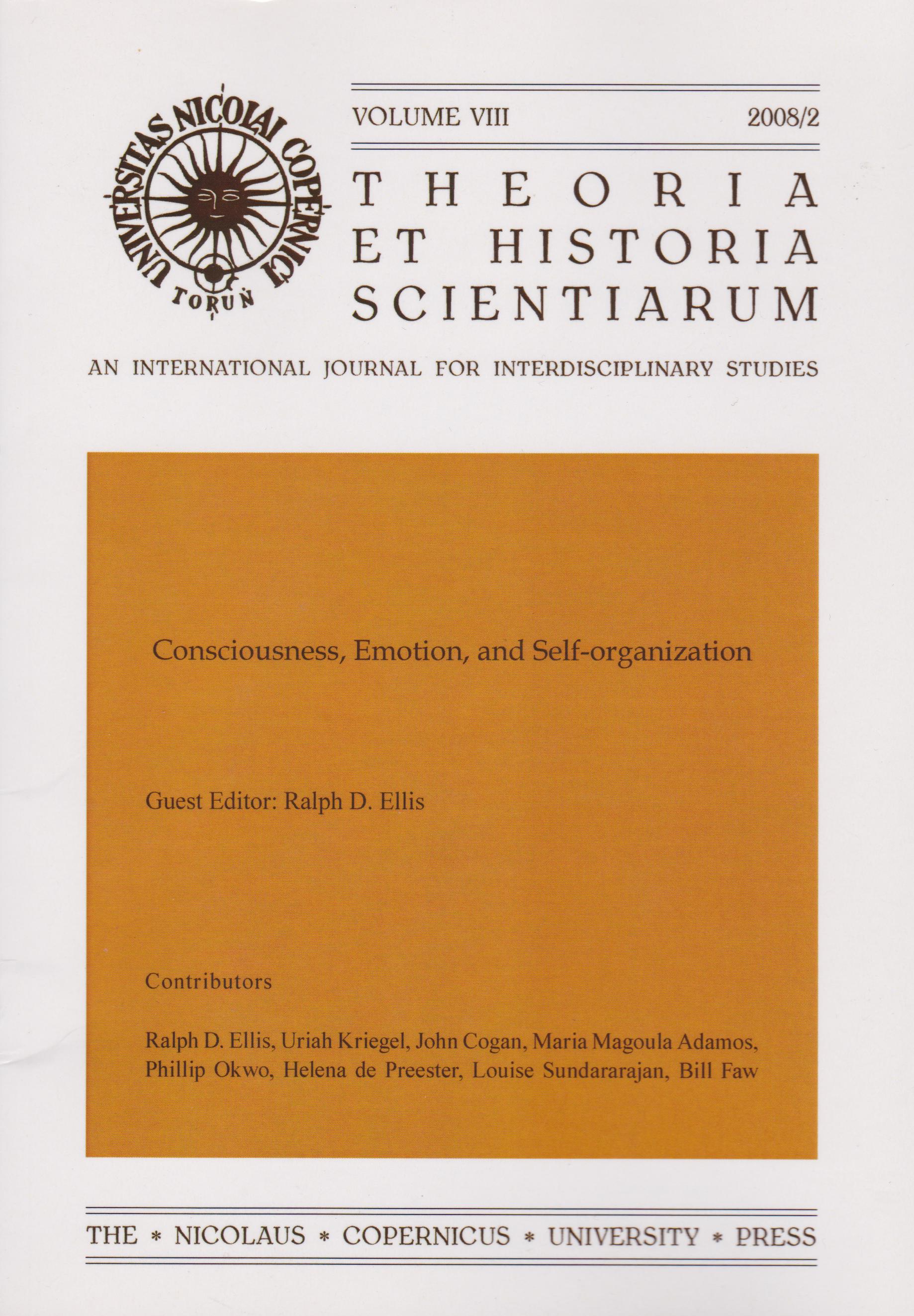How the Effect of Emotion on the Selectivity of Attention Supports Self-Organizing Dynamical Systems as an Explanation of Consciousness
DOI:
https://doi.org/10.12775/ths.2008.016Keywords
Dynamical systems, emotion, consciousness, mental causation, micro-genesis, inattentional blindness, event related potentials, attention, enactive theoryAbstract
This paper attempts to provide a systematic argument, on both philosophical and neuropsychological grounds, for an “enactive” and self-organizational explanation for consciousness. The self-organizational approach offers solutions to problems that have stumped philosophers for centuries, including the problem of mental causation. Mental causation is a mystery because it seems that the unified being, the conscious person or animal, is able to make its own parts combine in certain ways to serve the purposes of the whole, rather than having its form merely dictated by the accidental ways in which the constituents come together. The theory of self-organization explicitly addresses this problem as its basic starting point. Also, many psychological puzzles about consciousness can be addressed by means of a self-organizational approach. In this paper, we consider the Mack and Rock inattentional blindness phenomena; and the micro-genesis of perceptual experience, which presents the paradox that perceptual consciousness does not accompany virtually complete occipital activation, yet does accompany the parietal P300 event related potential, which however does not seem to be caused by the occipital activation at all. We also explore the way the enactive, dynamical systems account of emotional consciousness maps onto the relatively independent, unconditioned instinctual systems studied by Panksepp and associates, as discussed in the target article of this issue.
References
Aureli, C.G., 1989: Man’s triune conscious mind, Perceptual and Motor Skills 68: 747- -754
De Souza, R., 1987: The Rationality of Emotion, Bradford Books, Cambridge, Massachusetts
Ellis, R.D., 1999: Dynamical systems as an approach to consciousness: Emotion, self¬organization, and the mind-body problem, New Ideas in Psychology 17: 237-250
Ellis, R.D., 2001a: Can dynamical systems explain mental causation? Journal of Mind an Behavior 22: 311-334
Ellis, R.D., 2001b: Implications of inattentional blindness for “enactive” theories of consciousness, Brain and Mind 2: 297-322
Faucher, L. and Tappolet, C., 2002: Fear and the focus of attention, Consciousness & Emotion, 3(2): 105-144
Mack, A. and Rock, L, 1998: Inattentioiial Blindness, MIT/Bradford, Cambridge, Massachusetts
MacLeod, C., Mathews, A., Tata, P., 1986: Attentional bias in emotional disorders, Journal of Abnormal Psychology 95: 15-20
Mathews, A., Richards, A., Eysenck, M.W., 1989: The interpretation of homophones related to threat in anxiety state, Journal of Abnormal Psychology 98: 31-34
Mogg, K., Mathews, A., Weinmann, J., 1989: Selective processing of threat cues in anxiety states, Behaviour Research and Therapy 34: 17-36
Ohman, A., 2000: La biologie des passions, Pour la science 271: 50-57
Panksepp, J., 2000: The neuro-evolutionary cusp between emotions and cognitions, Consciousness & Emotion 1(1): 15-54
Aureli, C.G., 1989: Man’s triune conscious mind, Perceptual and Motor Skills 68: 747- -754
De Souza, R., 1987: The Rationality of Emotion, Bradford Books, Cambridge, Massachusetts
Ellis, R.D., 1999: Dynamical systems as an approach to consciousness: Emotion, self¬organization, and the mind-body problem, New Ideas in Psychology 17: 237-250
Ellis, R.D., 2001a: Can dynamical systems explain mental causation? Journal of Mind an Behavior 22: 311-334
Ellis, R.D., 2001b: Implications of inattentional blindness for “enactive” theories of consciousness, Brain and Mind 2: 297-322
Faucher, L. and Tappolet, C., 2002: Fear and the focus of attention, Consciousness & Emotion, 3(2): 105-144
Mack, A. and Rock, L, 1998: Inattentioiial Blindness, MIT/Bradford, Cambridge, Massachusetts
MacLeod, C., Mathews, A., Tata, P., 1986: Attentional bias in emotional disorders, Journal of Abnormal Psychology 95: 15-20
Mathews, A., Richards, A., Eysenck, M.W., 1989: The interpretation of homophones related to threat in anxiety state, Journal of Abnormal Psychology 98: 31-34
Mogg, K., Mathews, A., Weinmann, J., 1989: Selective processing of threat cues in anxiety states, Behaviour Research and Therapy 34: 17-36
Ohman, A., 2000: La biologie des passions, Pour la science 271: 50-57
Panksepp, J., 2000: The neuro-evolutionary cusp between emotions and cognitions, Consciousness & Emotion 1(1): 15-54
Downloads
Published
How to Cite
Issue
Section
Stats
Number of views and downloads: 466
Number of citations: 0



